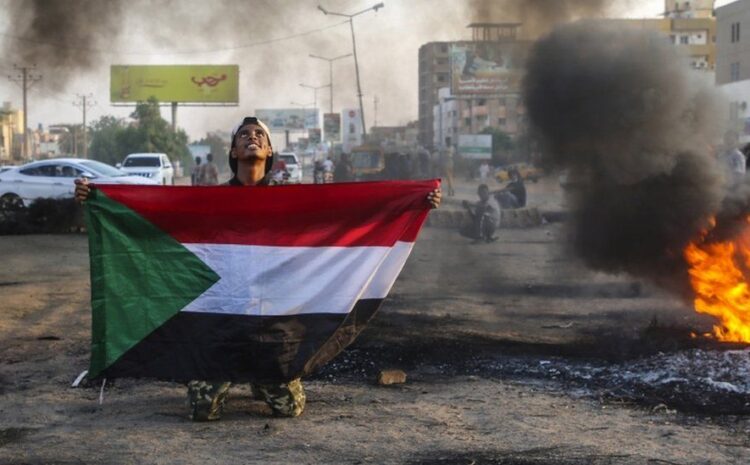
IMAGE SOURCE, EPA Image caption, Demonstrations against the coup are continuing
Political leaders were arrested on Monday, sparking nationwide protests and international condemnation.
The African Union (AU) has also suspended Sudan from the bloc over the “unconstitutional” seizure of power. The US has frozen $700m (£508m) in aid.
Sudan’s civilian and military leaders had been in a fragile power-sharing agreement for the past two years.
The sudden cut to aid is likely to have dire consequences for Sudan’s battered economy, at a time when it was just starting to get back on its feet.
The World Bank and AU moves put further pressure on the coup’s leader, Gen Abdel Fattah Burhan, to reinstate the civilian government.
The president of the World Bank, David Malpass, said in a statement: “I am greatly concerned by recent events in Sudan, and I fear the dramatic impact this can have on the country’s social and economic recovery and development.”
In March, Sudan was able to access billions of dollars in grants from the World Bank for the first time in nearly 30 years, after it cleared its arrears. At the time, Mr Malpass said that the country was making some economic progress, after years of being in a deep crisis.
The World Bank has contributed some $3bn in aid to Sudan to support agriculture, transport, health care and education, among other things, according to Prime Minister Abdalla Hamdok.
In a speech last month to the World Bank, he said that changes from the funding “have begun to bear fruits” as the economy showed signs of stabilising. Now, that is at risk again.
- Explainer: Sudan coup: A simple guide
- Analysis: Why the army is gambling with Sudan’s future
- Pictures: Sudan coup protesters take to streets
The AU tweeted that while it welcomed the release of the prime minister, who was detained on Monday, Sudan will remain suspended from its activities until the civilian government is reinstated.
Late on Wednesday, state media reported that six Sudanese ambassadors had been removed from their posts by the military.
Those withdrawn included the country’s representatives to the US, the European Union and China, all of whom have condemned the army’s takeover.
Street protests continued for a third day, with at least 10 people killed after soldiers opened fire on crowds. Troops reportedly travelled house to house in Khartoum arresting local protest organisers.
Trade unions representing doctors and oil workers said they were joining the demonstrations, as did staff at the Sudanese Banking Association.
“We stand firmly against any military action and any form of dictatorship,” the association’s spokesman, Abdul Rashid Khalifa, told the BBC.
The agreement between civilian and military leaders was signed in 2019 after long-time ruler Omar al-Bashir was overthrown. The power-sharing was designed to steer Sudan towards democracy but has proven fragile with a number of previous coup attempts, the last just over a month ago.


Sudan’s economy has long been in dire straits, and ordinary people are likely to experience more pain.
Shortages of bread and skyrocketing prices of basic commodities led to mass protests, and the overthrow of Omar al-Bashir two years ago.
Under his rule, Sudan became a pariah in the West. The civilian-led government which took office after he was ousted sought to rebuild international relations to secure funding. Much of it is being lost now, threatening to derail Sudan’s economic recovery.
There have been suggestions that the coup leaders have the support of some Arab League states. But their room to manoeuvre is getting smaller as international pressure grows.
The US has said it is in talks with Gulf states about the situation in Sudan, while the African Union’s decision to suspend its membership increases the isolation of the generals.
